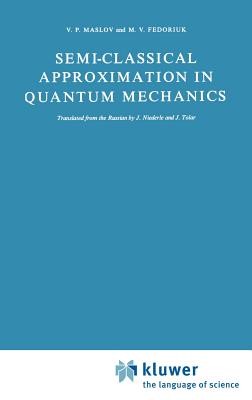
- We will send in 10–14 business days.
- Author: Victor P Maslov
- Publisher: Springer
- Year: 1981
- Pages: 302
- ISBN-10: 9027712190
- ISBN-13: 9789027712196
- Format: 15.6 x 23.4 x 1.9 cm, hardcover
- Language: English
- SAVE -10% with code: EXTRA
Semi-Classical Approximation in Quantum Mechanics (e-book) (used book) | bookbook.eu
Reviews
Description
This volume is concerned with a detailed description of the canonical operator method - one of the asymptotic methods of linear mathematical physics. The book is, in fact, an extension and continuation of the authors' works [59], [60], [65]. The basic ideas are summarized in the Introduction. The book consists of two parts. In the first, the theory of the canonical operator is develop- ed, whereas, in the second, many applications of the canonical operator method to concrete problems of mathematical physics are presented. The authors are pleased to express their deep gratitude to S. M. Tsidilin for his valuable comments. THE AUTHORS IX INTRODUCTION 1. Various problems of mathematical and theoretical physics involve partial differential equations with a small parameter at the highest derivative terms. For constructing approximate solutions of these equations, asymptotic methods have long been used. In recent decades there has been a renaissance period of the asymptotic methods of linear mathematical physics. The range of their applicability has expanded: the asymptotic methods have been not only continuously used in traditional branches of mathematical physics but also have had an essential impact on the development of the general theory of partial differential equations. It appeared recently that there is a unified approach to a number of problems which, at first sight, looked rather unrelated.
EXTRA 10 % discount with code: EXTRA
The promotion ends in 19d.18:08:37
The discount code is valid when purchasing from 10 €. Discounts do not stack.
- Author: Victor P Maslov
- Publisher: Springer
- Year: 1981
- Pages: 302
- ISBN-10: 9027712190
- ISBN-13: 9789027712196
- Format: 15.6 x 23.4 x 1.9 cm, hardcover
- Language: English English
This volume is concerned with a detailed description of the canonical operator method - one of the asymptotic methods of linear mathematical physics. The book is, in fact, an extension and continuation of the authors' works [59], [60], [65]. The basic ideas are summarized in the Introduction. The book consists of two parts. In the first, the theory of the canonical operator is develop- ed, whereas, in the second, many applications of the canonical operator method to concrete problems of mathematical physics are presented. The authors are pleased to express their deep gratitude to S. M. Tsidilin for his valuable comments. THE AUTHORS IX INTRODUCTION 1. Various problems of mathematical and theoretical physics involve partial differential equations with a small parameter at the highest derivative terms. For constructing approximate solutions of these equations, asymptotic methods have long been used. In recent decades there has been a renaissance period of the asymptotic methods of linear mathematical physics. The range of their applicability has expanded: the asymptotic methods have been not only continuously used in traditional branches of mathematical physics but also have had an essential impact on the development of the general theory of partial differential equations. It appeared recently that there is a unified approach to a number of problems which, at first sight, looked rather unrelated.


Reviews